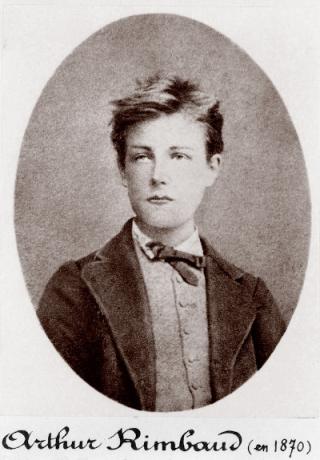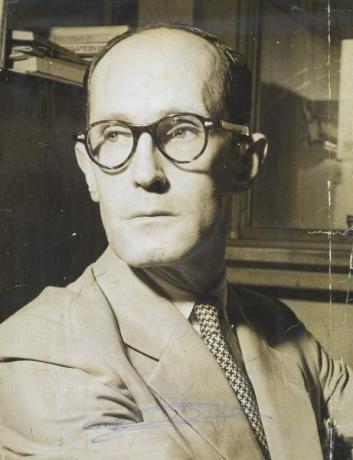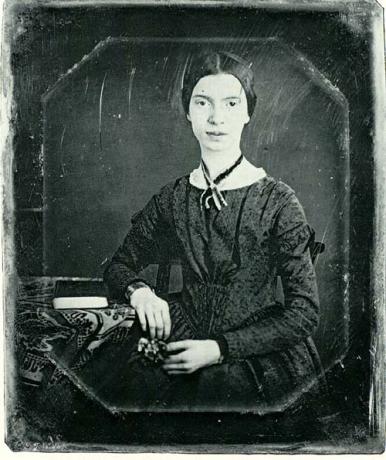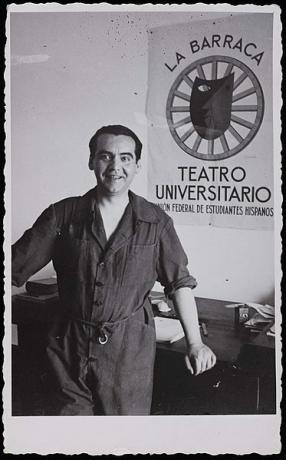March 21 — World Poetry Day— was the day chosen, at the XXX General Conference of Unesco (United Nations Educational, Scientific and Cultural Organization), in 1999, to honor poetry, promote the diversity of languages and intensify exchanges between cultures.. It is also an opportunity for readers to learn about the poetry of new authors, in addition to revering the great names of world poetry, such as: Arthur Rimbaud, Carlos Drummond de Andrade, Emily Dickinson, Federico García Lorca, Maya Angelou, among many others.
See too: Castro Alves – biography and works of the poet of slaves
How did World Poetry Day come about?
World Poetry Day appeared in XXX UNESCO General Conference, in 1999, when March 21 was chosen for the annual commemoration of this art that spans the centuries. This initiative was intended to give "recognition and new impulse to national, regional and international poetic movements”, according to the minutes |1| of the conference.

The creation of this date is intended to promote language diversity, “since, through poetry, threatened languages will have greater possibilities to express themselves within their respective communities”. Furthermore, it means the "acceptance of the word as an element that socializes and structures the person" and “it can help young people to rediscover core values”, in addition to “it allows them to reflect on themselves”.
And, finally, because, "as poetry is an art that has its roots in the word, both written and oral, every activity in its favor should contribute to the intensification of international intercultural exchanges”.
See too: The trajectory of black representation in Brazilian literature
What does World Poetry Day celebrate?
World Poetry Day is a date that celebrates not only the art of making poems, but the role poetry plays in any society, for being an instrument of union and also of contestation. Thus, every year, Unesco issues a commemorative message that focuses on themes or problems that can eventually be discussed by poetic art.
In more recent releases, such as the one from 2015, UNESCO, through its general director, cited the Scottish poet John Burnside, in order to extol the “power of poetry”, “the power of imagination to illuminate reality, to inspire our thoughts with something more creative than discouragement”.
In 2016, a quote from the English poet and playwright William Shakespeare opened the statement, to “pay homage to the men and women whose only instrument is freedom of expression, [men and women] who imagine and act”.
the american poet Henry Wadsworth Longfellow was quoted in 2017, given his hopeful words, "at a time when the challenges we face — from climate change, inequality and poverty to violent extremism — seem so daunting."
In 2018, the chosen poet was the american Langston Hughes, who “put his art at the service of the fight against discrimination suffered by the African-American community”.
the highlight in 2019 went to the canadian poet Wayne Keon, in homage to indigenous poetry, “to celebrate the unique and powerful role that poetry has to oppose marginalization and injustice, as well as to unite cultures in the spirit of solidarity”.
In these communications, Unesco, through its director or general director, gives indications of the importance of March 21 and what it celebrates. In the 2016 message, Director General Irina Bokova said: “Today, I applaud professionals, actors, storytellers and all those anonymous voices committed to and through poetry, performing readings in the shadows or in the spotlight, in gardens or in the streets".
In 2017, she wrote: “By celebrating poetry today, we celebrate our ability to unite, in a spirit of solidarity, to climb ‘the foggy peaks of our time’”.
Director-General Audrey Azoulay, in 2018, declared: “This day is also the time to pay tribute to all the people who bring this important art to life.: the poets, of course, but also the translators, editors and organizers of readings and poetry festivals”.
It was clear, therefore, that on March 21st — World Poetry Day — the world is honoring poetry, the poet and poet, translators, editors, readers and languages, besides, of course, one day in reflection on the numerous themes that permeate the verses of all the poets and poets of the past and present.
Read too: April 18 – National Children's Book Day
great names of poetry
The list of great names in world poetry is extensive, so we chose five of them to honor:
Arthur Rimbaud
Arthur Rimbaud (1854-1891) is a french poet symbolist. He is considered a genius who revolutionized French poetry. In 1871 he met the French poet Paul Verlaine (1844-1896), already recognized as a writer, with whom he had a loving relationship. Verlaine was the great promoter of Rimbaud's poetry.

The two traveled together to London, where they lived for some time. It is believed that it was during this period in England that Rimbaud wrote his two masterpieces: Illuminations and a season in hell. In 1873, the two poets separated, Rimbaud forever abandoned the literature and went to live in Africa.
Next, one of the sonnets best known and studied by Arthur Rimbaud:
Vowels
A black, E white, I red, U green, O blue, vowels,
I will still unravel its latent mysteries:
A, veiled fly of glittering flies
That buzz around the swampy acres;
And, white candor of tents and sands
Ice spears, white kings, trembling flowers;
I, crimson sputum, rubies laughing in their teeth
Of wrath or illusion in sad bacchanals;
U, curves, green ocean vibrations,
Peace of vegetables, peace of pastures, peace of years
That wrinkles are weaving between mists and snags;
O, supreme Cry full of strange verses,
Haunted silences of angels and universes;
— Ó! Omega, the violet sun of his eyes! |2|
Carlos Drummond de Andrade
Carlos Drummond de Andrade (1902-1987) is a poet from Minas Gerais and modernist, considered one of the greatest Brazilian poets read today. It is a mark of your poetry the everyday theme. In 1928, he became known when he published in the Journal of Anthropophagy, your poem Midway, which caused quite a stir in the literary world.

For fifty years, wrote to newspapers. In addition, he has published several poetry books and became influence for young poets Argentina, Chile, Mexico and Peru. He was a Portuguese teacher in Itabira, her hometown, and worked as editor-in-chief at the newspaper Mine Diary, in Belo Horizonte. She joined the civil service in 1929, a job she held until her retirement.
Below is the poem that made Carlos Drummond de Andrade a well-known poet:
Midway
In the middle of the way there was a stone
there was a stone in the middle of the way
had a stone
in the middle of the way there was a stone.
I will never forget this event
in the life of my so tired retinas.
I'll never forget that halfway
had a stone
there was a stone in the middle of the way
in the middle of the way there was a stone.
Read too: Conceição Evaristo – great exponent of contemporary literature
Emily Dickinson
Emily Dickinson (1830-1886) is a american poetess romantic. Your first volume of poems it was not published until 1890, after her death, and was very successful. Dickinson lived a reclusive life and never married. The countless letters she wrote are read and re-read in an attempt to shed light on her life – for many, obscure.

Death, one of the main themes of Emily Dickinson's poetry, is the subject of the following poem:
Because she couldn't stop for Death
Because I couldn't stop Death, she
She stopped for me out of kindness.
In the coach we could only fit the two
And Immortality.
Slow Travel — She was in no hurry,
And I had already put aside
My work and all my leisure,
For your exclusive pleasure.
We passed school — at ring kids
They played fighter —
We passed the fields of the stunned grain —
We pass through the sun-set —
Better to say, he passed us.
And the serene went down icy —
And my tunic was thin gauze —
And my cape, just tulle.
We stopped at a house; looked like
A swollen clod:
The roof of the house was barely visible,
The cornice is flush with the ground.
It's been centuries since then — but they seem
Less than day, in fact,
In what I saw, from the horses' foreheads,
That they were going to eternity. |3|
Federico García Lorca

Federico García Lorca (1898-1936) is a spanish poetmodernistof the so-called “Generation of 27”. In addition to poetry, he also wrote for the theater, to which he devoted himself more intensely in the last years of his life. It is considered the most read spanish poet of all time.
Below is one of his poems from the book Poet in New York:
1910 (Intermezzo)
Those nineteen hundred and ten eyes of mine
have not seen bury the dead,
nor the ash fair of the one who cries at dawn,
nor the heart that trembles harassed like a seahorse.
Those nineteen hundred and ten eyes of mine
saw the white wall where the girls were pissing,
the muzzle of the bull, the poisonous mushroom
and an incomprehensible moon that lit the wilds
the bits of dried lemon under the hard black of the bottles.
Those eyes of mine on the mare's neck,
in the transfixed chest of sleeping Santa Rosa,
on the roofs of love, with moans and fresh hands,
in a garden where cats ate frogs.
Attic where the ancient dust congregates statues and mosses,
boxes that keep the silence of devoured crabs
in the place where dream stumbles with reality.
There, my little eyes.
Don't ask me anything. I saw that things
when they seek her course they find their emptiness.
There is a hollow pain in the air without people
and in my eyes clothed creatures — no nudity! |4|
maya angelou
maya angelou (1928-2014), pseudonym of Marguerite Johnson, is a american poetess. She was a singer, dancer, actress, songwriter and Hollywood's first black director, as well as editor, essayist, playwright and poet. She has also served as a professor at Wake Forest University.
![Maya Angelou was an American artist who worked in the most diverse areas. [1]](/f/d2b57b3a8005c98f17806c8016e191da.jpg)
Civil rights activist, worked with Martin Luther King Jr. and Malcolm X. In 2000, she received the National Medal of Arts from the hands of President Bill Clinton and, in 2010, the Presidential Medal of Freedom, delivered by President Barack Obama.
The following is one of Maya Angelou's best known poems:
I still get up
you can scratch me from history
With lies thrown into the air.
You can throw me against the dirt floor,
But still, like dust, I will rise.
Does my presence bother you?
Why does my glow intimidate you?
Because I walk like someone who has
Riches worthy of the Greek Midas.
Like the moon and like the sun in the sky,
With the certainty of the wave at sea,
Like hope emerging from doom,
So I will get up.
Didn't you want to see me broken?
Head bowed and eyes to the ground?
Shoulders slumped like tears,
My soul weakened by loneliness?
Does my pride offend you?
I'm sure yes
Because I laugh like someone who has
Hidden diamonds in me.
You can throw me sharp words,
To tear me apart with your gaze,
You can kill me in the name of hate,
But still, like air, I will rise.
Does my sensuality bother you?
Did you ask yourself
why do i dance like i have
A diamond where thighs meet?
From the favela, from the humiliation imposed by color
I stand up
From a past rooted in pain
I stand up
I am a dark ocean, deep in faith,
Growing and expanding like the tide.
Leaving behind nights of terror and atrocity
I stand up
Towards a new day of intense clarity
I stand up
Bringing with me the gift of my ancestors,
I carry the dream and hope of enslaved man.
And so I get up
I stand up
I stand up. |5|
Grades
|1| Translation of excerpts from the minutes cited here: Warley Souza.
|2| Translation by Augusto de Campos.
|3| Translated by Aíla de Oliveira Gomes.
|4| Translated by Décio Pignatari.
|5| Translated by Mauro Catopodis.
Image credit
[1]Maya Angelou in Baltimore/commons
by Warley Souza
Literature teacher
Source: Brazil School - https://brasilescola.uol.com.br/datas-comemorativas/21-de-marco-dia-mundial-da-poesia.htm
